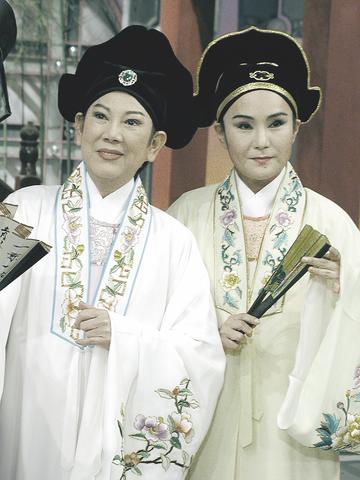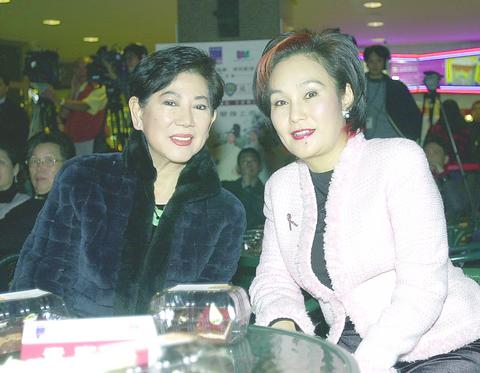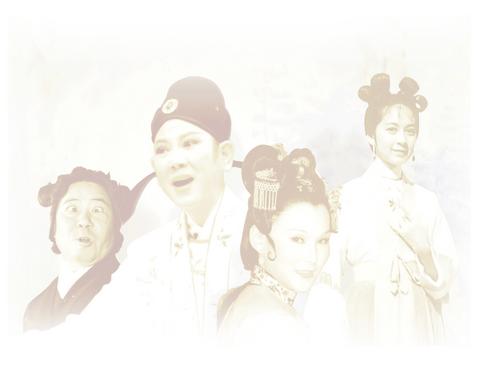In October, 1963, 200,000 movie fans crammed what was then Taipei's Sungshan International Airport to welcome movie star Ling Bo (凌波), lead actress in the film The Love Eterne (梁山伯與祝英台). The frenzy even had the Hong Kong press shaking their heads in disbelief, calling Taiwanese fans "crazy." According to contemporary news reports, a dozen people ended up with broken ribs when they fell from a high platform they had climbed to get a better view of the star. Female fans had their dresses torn as they fought through the crowd in the airport lobby. Two taxis were crashed by the crowd. At a press conference closed to the public, a young fan managed to get in and was found under the table kissing the actresses' feet.
This frenzy over Ling still lives in the memory of many middleaged Taiwanese. It also made huangmei musicals an important genre in Chinese-language cinema.
Forty years after the film came to Taiwan, Ling Bo, and the other cast members of the blockbuster film are back in Taiwan to perform the musical live, even though the average age of the main cast members is now 60. Titled Liang Shan-po and Chu Ying-tai, the names of the protagonists in this Romeo and Juliet tragedy, the revival stage show will have a total of eight performances. Opening in Taipei this evening, the show will tour Taichung and Kaohsiung, before returning to Taipei for two additional performances that have been schedule to meet popular demand.

PHOTO COURTESY OF DA DA
Few performers have stood the test of time so well, for Ling's star quality is not the least dimmed after 40 years, 20 of those in retirement.
"This live performance is primarily for my loyal fans," the 63-year-old Ling told Taipei Times during rehearsal. She said she normally rejects all on-stage performances these days, but even now her gestures, steps and singing are as proficient as ever. Her handsome, androgynous face is still much as it was when she played the young scholar Liang Shan-po 40 years ago. It was this face that captured the hearts of so many female fans, and which can also be seen in her female roles as the brave woman or warrior in 1970s Shaw Brothers films, establishing this style of screen persona long before the appearance of Michelle Yeoh or Zhang Ziyi.
The film The Love Eterne was so popular in Taiwan that it was replayed numerous times and many people can sing the arias from memory. For members of one Ling Bo fan club, the membership requirement was to have seen the film more than 50 times; even with this, the club had a membership of over 200 people.

PHOTO: TAIPEI TIMES
"The fans were just so passionate. Whenever I'd sing, they would toss jade bracelets and gold necklaces onto the stage for me. I remember meeting with an old lady who said she'd seen the film 180 times, and she gave me a scarf in which a bunch of jewelry was wrapped, said Ling.
Although now in her 60s and suffering from breast cancer, it was for her fans that Lin decided to accept the tough schedule of Taiwan performances.
"I'm happy to see that the love for huangmei musicals is being passed down to a younger generation," she said.

The story of Liang Shan-po and Chu Ying-tai goes back 200 years and has been called the Chinese Romeo and Juliet. A twist to the story is the fact that Chu Ying-tai is dressed as a boy when the two first meet, and they become best friends, carrying on a flirtation that hints at Chu's sex. When Chu is revealed as a women, her friend Liang immediately falls in love with her. Their love is hindered by Chu's father, who has set his eyes on a rich husband for his daughter. The pair sacrifice themselves on the altar of love and in death are united as butterflies. This has given this famous story another popular English title: The Butterfly Lovers.
To relive the sentiments of 40 years ago, the show's organizer has brought back the original cast: Lee Kun (
Hu, also a veteran actress in Shaw Brothers movies, is now like Ling Bo, a breast cancer patient. In a way, the show represents a team fighting against age and illness for the sake of recapturing the sentiments and art of this southern Chinese opera.
At rehearsal, Lee Kun expressed some worry about his physical condition. In one scene, he has to get down on his knees before his master's grave. "What if I can't get up," Lee asked. "It's all right," said the 68-year-old Ren, "it you can't get up, I'll pull you up."
This revival is a lavish production accompanied by the live Chinese orchestra. All the costumes were tailor-made in Shanghai and Ling even had a pair of boots specially made for the show.
Ticket sales have been extremely brisk and performances today and tomorrow in Taipei have been completely sold out as have all seats for Taichung. Some tickets remain for the Kaohsiung show, and Taipei audiences have the chance of catching the musical in two additional performances scheduled for Jan. 10 and Jan. 11, for which tickets remain.
What: Liang Shan-po and Chu Ying-tai
When and Where: Tomorrow and Sunday at the Sun Yat-sen Memorial Hall Taipei at 7:30pm (sold out); Jan. 10 and 11 at the National Theater Taipei at 7:45pm; Dec. 15 in Taichung; Dec. 21 and Dec. 22 in Kaohsiung
Tickets: NT$1,500 to NT$2,500 are still available through Era ticketing

Cheng Ching-hsiang (鄭青祥) turned a small triangle of concrete jammed between two old shops into a cool little bar called 9dimension. In front of the shop, a steampunk-like structure was welded by himself to serve as a booth where he prepares cocktails. “Yancheng used to be just old people,” he says, “but now young people are coming and creating the New Yancheng.” Around the corner, Yu Hsiu-jao (饒毓琇), opened Tiny Cafe. True to its name, it is the size of a cupboard and serves cold-brewed coffee. “Small shops are so special and have personality,” she says, “people come to Yancheng to find such treasures.” She

Late last month Philippines Foreign Affairs Secretary Theresa Lazaro told the Philippine Senate that the nation has sufficient funds to evacuate the nearly 170,000 Filipino residents in Taiwan, 84 percent of whom are migrant workers, in the event of war. Agencies have been exploring evacuation scenarios since early this year, she said. She also observed that since the Philippines has only limited ships, the government is consulting security agencies for alternatives. Filipinos are a distant third in overall migrant worker population. Indonesia has over 248,000 workers, followed by roughly 240,000 Vietnamese. It should be noted that there are another 170,000

In July of 1995, a group of local DJs began posting an event flyer around Taipei. It was cheaply photocopied and nearly all in English, with a hand-drawn map on the back and, on the front, a big red hand print alongside one prominent line of text, “Finally… THE PARTY.” The map led to a remote floodplain in Taipei County (now New Taipei City) just across the Tamsui River from Taipei. The organizers got permission from no one. They just drove up in a blue Taiwanese pickup truck, set up a generator, two speakers, two turntables and a mixer. They

Hannah Liao (廖宸萱) recalls the harassment she experienced on dating apps, an experience that left her frightened and disgusted. “I’ve tried some voice-based dating apps,” the 30-year-old says. “Right away, some guys would say things like, ‘Wanna talk dirty?’ or ‘Wanna suck my d**k?’” she says. Liao’s story is not unique. Ministry of Health and Welfare statistics show a more than 50 percent rise in sexual assault cases related to online encounters over the past five years. In 2023 alone, women comprised 7,698 of the 9,413 reported victims. Faced with a dating landscape that can feel more predatory than promising, many in